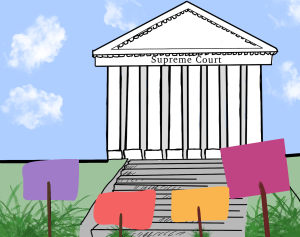 Last year, when the U.S. Supreme Court ruled in favor of the state of Mississippi in Dobbs v. Jackson Women’s Health Organization, the decision dismantled 50 years of constitutional protection of abortion rights under Roe v. Wade and returned to individual states the power to regulate any aspect of abortion not protected by federal law.
Last year, when the U.S. Supreme Court ruled in favor of the state of Mississippi in Dobbs v. Jackson Women’s Health Organization, the decision dismantled 50 years of constitutional protection of abortion rights under Roe v. Wade and returned to individual states the power to regulate any aspect of abortion not protected by federal law.
Mississippi was one of the 13 states with trigger laws in place that almost immediately banned or restricted abortion when Roe v. Wade was overturned.
“Because there is a lack of a federal standard, each state is addressing the issues differently and in Mississippi specifically, women are being deprived of this right on almost all fronts,” vice president of UM College Democrats Frances Madden said. “A lot of women that need this healthcare are banned from going to other states or they don’t have legal rights to go to other states and receive healthcare.”
Sociology and anthropology professor Ana Milenova Velitchkova said that pregnant people have lost adequate health care following the overturning of Roe v. Wade.
“Pregnant people have lost the right to benefit from and their health providers have lost the right to provide the best health care possible,” Velitchkova said. “This is certainly going to lead to negative health outcomes and even death for pregnant people.”
There are some people that think overturning Roe v. Wade and giving power back to the states comes with benefits.
“I think the benefits of the overturn are allowing the power to go back to the states. It’s more likely that a larger range of voices will be heard when we give power to the courts with the most direct representation,” Reagan Kurtz, sophomore hospitality management major, said. “I think it allows voters to feel more included in the law making and passing process, which is a big step in a world where everyone wants their voice heard.”
Velitchkova said the willingness of the Supreme Court to overturn Roe v. Wade could also affect LGBTQIA+ rights. In a concurring opinion, Justice Clarence Thomas wrote that “we should reconsider all of this Court’s substantive due process precedents, including Griswold, Lawrence, and Obergefell.”
Obergefell v. Hodges legalized same-sex marriage, Griswold v. Connecticut gave married people the right to obtain contraceptives and Lawrence v. Texas invalidated sodomy laws.
“What happens with LGBTQIA+ rights at the Supreme Court level will depend on conservative justices’ calculus regarding these conflicting interests. If they decide to continue pursuing their extreme political agenda no matter the cost, their decisions will cause a lot of suffering,” Velitchkova said.
In the future, Velitchkova said that there will be mobilizing around reproductive rights as well as other issues.
“The overturning of Roe v. Wade shows that no right is given. If we want certain rights, we must defend them,” Velitchkova said. “Mobilizing around reproductive rights will highlight other important issues affecting pregnant people too. These include access to healthcare, access to childcare, and the elimination of child poverty among others.”


























